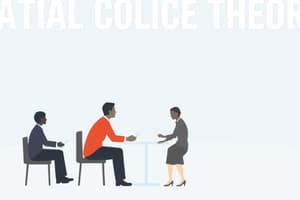Podcast
Questions and Answers
What is the primary reason people form relationships?
What is the primary reason people form relationships?
- Because they are motivated by what is best for others
- Because they are driven by emotions and passion
- Because they are motivated by self-interest and interdependence (correct)
- Because they are forced by society to do so
What is the concept that guides human interactions according to social exchange theory?
What is the concept that guides human interactions according to social exchange theory?
- Self-reliance and independence
- Social norms and values
- Personal emotions and feelings
- Self-interest and interdependence (correct)
What is the assumption behind social exchange theory?
What is the assumption behind social exchange theory?
- People are driven by social norms and values
- People are motivated by what is best for others
- People make rational choices based on their emotions
- People make rational choices based on evaluating rewards and punishments (correct)
What is a limitation of social exchange theory?
What is a limitation of social exchange theory?
What is a criticism of rational choice theory?
What is a criticism of rational choice theory?
What is a criticism of exchange theory?
What is a criticism of exchange theory?
Why do people form relationships?
Why do people form relationships?
What is a limitation of social exchange theory in explaining social structures?
What is a limitation of social exchange theory in explaining social structures?
What is a criticism of rational choice theory and social exchange theory?
What is a criticism of rational choice theory and social exchange theory?
What is the main idea behind social exchange theory?
What is the main idea behind social exchange theory?
What is a key factor that influences how people evaluate interactions?
What is a key factor that influences how people evaluate interactions?
Why do people in modern society form relationships?
Why do people in modern society form relationships?
What do people do when evaluating interactions with others?
What do people do when evaluating interactions with others?
What is a common critique of rational choice theory?
What is a common critique of rational choice theory?
What do critics argue about the formation of relationships?
What do critics argue about the formation of relationships?
What is a common limitation of social exchange theory?
What is a common limitation of social exchange theory?
According to social exchange theory, what guides human behavior?
According to social exchange theory, what guides human behavior?
What do rational choice theory and exchange theory attempt to explain?
What do rational choice theory and exchange theory attempt to explain?
What is a key aspect of social exchange theory?
What is a key aspect of social exchange theory?
What is a limitation of rational choice theory and exchange theory?
What is a limitation of rational choice theory and exchange theory?
What is the underlying assumption behind the idea that people form relationships based on self-interest and interdependence?
What is the underlying assumption behind the idea that people form relationships based on self-interest and interdependence?
What is the primary criticism of rational choice theory with regard to people's choices?
What is the primary criticism of rational choice theory with regard to people's choices?
What is the limitation of social exchange theory in explaining social structures?
What is the limitation of social exchange theory in explaining social structures?
What is the key factor that influences how people evaluate interactions with others?
What is the key factor that influences how people evaluate interactions with others?
What is the main goal of rational choice theory and exchange theory?
What is the main goal of rational choice theory and exchange theory?
Flashcards are hidden until you start studying
Study Notes
Rational Choice Theory
- Assumes that people are motivated by self-interest and seek to maximize personal gain
- People act rationally, weighing the costs and benefits of possible actions
- Rationality is a property of a series of choices, not an individual choice
- People calculate the costs and benefits of every action and choose the one with the best outcome for themselves
Underlying Assumptions of Rational Choice Theory
- Completeness: every action can be ranked
- Transitivity: if A is preferable to B, and B is preferable to C, then A is preferable to C
- Independence of irrelevant alternatives: adding a new option won't change the ranking of existing options
Exchange Theory
- An application of rational choice theory to social interactions
- Looks at society as a series of interactions between individuals
- Studied in the context of family relationships, work relationships, partner selection, and other interpersonal interactions
Exchange Theory Assumptions
- People seek to rationally maximize their profits
- Behavior that results in a reward is likely to be repeated
- The more often a reward is available, the less value it has
- Interactions operate within social norms
- People have access to the information they need to make rational choices
- Most human fulfillment comes from other people
- The standards people use to evaluate interactions change over time and differ from person to person
Social Exchange and Interdependence
- Central to social exchange are the concepts of self-interest and interdependence
- We form relationships to benefit ourselves and because we depend on other people to live
- Most people in modern society cannot be completely self-sufficient
Criticisms of Rational Choice Theory and Exchange Theory
- Do people really make rational choices?
- Limited choices due to social factors like gender, ethnicity, or social class
- Why do people do things that benefit others more than themselves?
- Why do people follow social norms that cause them to act in the best interests of others?
- Is it really possible to explain every social structure by the actions of individuals?
- Reducing human interactions to a rational process of comparing pros and cons is oversimplification
Rational Choice Theory
- Assumes that people are motivated by self-interest and seek to maximize personal gain
- People act rationally, weighing the costs and benefits of possible actions
- Rationality is a property of a series of choices, not an individual choice
- People calculate the costs and benefits of every action and choose the one with the best outcome for themselves
Underlying Assumptions of Rational Choice Theory
- Completeness: every action can be ranked
- Transitivity: if A is preferable to B, and B is preferable to C, then A is preferable to C
- Independence of irrelevant alternatives: adding a new option won't change the ranking of existing options
Exchange Theory
- An application of rational choice theory to social interactions
- Looks at society as a series of interactions between individuals
- Studied in the context of family relationships, work relationships, partner selection, and other interpersonal interactions
Exchange Theory Assumptions
- People seek to rationally maximize their profits
- Behavior that results in a reward is likely to be repeated
- The more often a reward is available, the less value it has
- Interactions operate within social norms
- People have access to the information they need to make rational choices
- Most human fulfillment comes from other people
- The standards people use to evaluate interactions change over time and differ from person to person
Social Exchange and Interdependence
- Central to social exchange are the concepts of self-interest and interdependence
- We form relationships to benefit ourselves and because we depend on other people to live
- Most people in modern society cannot be completely self-sufficient
Criticisms of Rational Choice Theory and Exchange Theory
- Do people really make rational choices?
- Limited choices due to social factors like gender, ethnicity, or social class
- Why do people do things that benefit others more than themselves?
- Why do people follow social norms that cause them to act in the best interests of others?
- Is it really possible to explain every social structure by the actions of individuals?
- Reducing human interactions to a rational process of comparing pros and cons is oversimplification
Rational Choice Theory
- Assumes that people are motivated by self-interest and seek to maximize personal gain
- People act rationally, weighing the costs and benefits of possible actions
- Rationality is a property of a series of choices, not an individual choice
- People calculate the costs and benefits of every action and choose the one with the best outcome for themselves
Underlying Assumptions of Rational Choice Theory
- Completeness: every action can be ranked
- Transitivity: if A is preferable to B, and B is preferable to C, then A is preferable to C
- Independence of irrelevant alternatives: adding a new option won't change the ranking of existing options
Exchange Theory
- An application of rational choice theory to social interactions
- Looks at society as a series of interactions between individuals
- Studied in the context of family relationships, work relationships, partner selection, and other interpersonal interactions
Exchange Theory Assumptions
- People seek to rationally maximize their profits
- Behavior that results in a reward is likely to be repeated
- The more often a reward is available, the less value it has
- Interactions operate within social norms
- People have access to the information they need to make rational choices
- Most human fulfillment comes from other people
- The standards people use to evaluate interactions change over time and differ from person to person
Social Exchange and Interdependence
- Central to social exchange are the concepts of self-interest and interdependence
- We form relationships to benefit ourselves and because we depend on other people to live
- Most people in modern society cannot be completely self-sufficient
Criticisms of Rational Choice Theory and Exchange Theory
- Do people really make rational choices?
- Limited choices due to social factors like gender, ethnicity, or social class
- Why do people do things that benefit others more than themselves?
- Why do people follow social norms that cause them to act in the best interests of others?
- Is it really possible to explain every social structure by the actions of individuals?
- Reducing human interactions to a rational process of comparing pros and cons is oversimplification
Studying That Suits You
Use AI to generate personalized quizzes and flashcards to suit your learning preferences.




